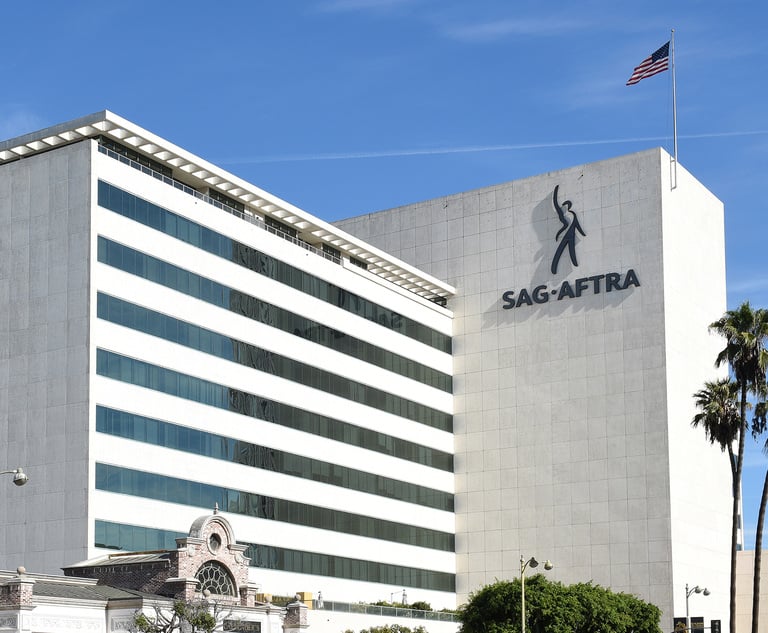 A page from "Oh, the Places You'll Boldly Go," as reproduced in appellate briefing.
A page from "Oh, the Places You'll Boldly Go," as reproduced in appellate briefing.The Starship Enterprise's Voyage to Fair Use
A copyright dispute over a Dr. Seuss-Star Trek mash-up is generating intense amicus interest at the Ninth Circuit.
October 18, 2019 at 07:28 PM
4 minute read
The Supreme Court is set to decide next month whether to review Oracle America Corp. and Google LLC's nine-year fight over copyright fair use. In the meantime, a mash-up of Dr. Seuss children's books and "Star Trek" television shows might provide the next big appellate test of the fair use doctrine.
The amicus briefs have been pouring into the Ninth Circuit in Dr. Seuss Enterprises v. ComicMix, in which the licensing arm of the late author is trying to shut down a book project with the title "Oh, the Places You'll Boldly Go." The case has generated a split of authority even among noted University of California, Berkeley, School of Law IP scholars.
Dr. Seuss began after publisher ComicMix LLC launched a Kickstarter campaign for the project. Written by science fiction author David Gerrold and illustrated by Ty Templeton, the book placed Captain James T. Kirk and other "Star Trek" characters in Whoville and other Seussian settings while tracking the themes of Dr. Seuss' best-seller, "Oh, the Places You'll Go."
Dr. Seuss Enterprises L.P., which licenses the late Theodor Geisel's works, including collaborations with third parties such as "Oh, the Pets You Can Get," sued for copyright infringement and forced Kickstarter to freeze the campaign at $29,575. An initial 5,000-copy printing was canceled.
U.S. District Judge Janis Sammartino of the Southern District of California granted summary judgment to ComicMix. The mash-up was "highly transformative" of the content, and Dr. Seuss Enterprises, or DSE, offered only hypothetical evidence that the mash-up would eat into the 3 million copies a year sold by "Oh, the Places You'll Go."
Backed by DLA Piper, DSE argues on appeal that the mash-up is a for-profit venture that adds no new purpose to the original work. Instead, the mash-up "merely aped the purpose of Go!: entertaining the readers (mostly graduates starting out in the world) with an uplifting story."
ComicMix and the individual defendants argue that their work is "a playful mash-up" that "deploys themes from Star Trek to contrast and critique Go!'s starkly egocentric, winner-take-all motif."
The amicus lineups on appeal are mostly familiar. The Motion Picture Association of America and the Copyright Alliance are supporting DSE. The MPAA warns that a finding of fair use would open the door for third parties to infringe on soundtracks, toys, games, clothing and other markets that derive from classic movies and TV shows.
On the other side, the Electronic Frontier Foundation and others argue that transformative mash-ups deserve fair use protection, and that "Boldly Go" in particular "recasts, recontextualizes, and adds new expression or meaning" to the Dr. Seuss works in ways designed to resonate with "Star Trek" fans. A group of IP scholars featuring Berkeley Law's Pamela Samuelson, Stanford's Mark Lemley and Harvard's Rebecca Tushnet say that a copyright owner must show a likelihood of harm to their traditional, reasonable or likely markets. A mere showing that a copyright owner "maintains a robust licensing program or participates in a seasonal market that the second comer would like to enter" isn't enough to carry that burden, they argue.
Berkeley Law's Peter Menell and UCLA's David Nimmer, who've supported Google's fair use defense in the context of software copyrights, came down squarely on the side of Dr. Seuss. "Boldly's slavish use of imaginative graphic images and text from Go! results in a commercial work that would, if marketed, directly compete with Go!'s graduation season book sales and licensing marketplaces," they write, along with University of Pennsylvania's Shyamkrishna Balganesh. "The result does not qualify for the fair use defense."
Dr. Seuss Enterprises is represented by DLA Piper partners Stanley Panikowski, Andrew Deutsch and Tamar Duvdevani and associate Marc Miller. ComicMix and the individual defendants are represented by Dan Booth of Dan Booth Law and Michael Licari of Sprinkle Lloyd & Licari.
This content has been archived. It is available through our partners, LexisNexis® and Bloomberg Law.
To view this content, please continue to their sites.
Not a Lexis Subscriber?
Subscribe Now
Not a Bloomberg Law Subscriber?
Subscribe Now
NOT FOR REPRINT
© 2024 ALM Global, LLC, All Rights Reserved. Request academic re-use from www.copyright.com. All other uses, submit a request to [email protected]. For more information visit Asset & Logo Licensing.
You Might Like
View All


'Transforming Children Into ATMs'?: Roblox, Epic Games Sued for Allegedly Fueling Addictive Behavior in Minors

SAG-AFTRA Union Health Plan Slammed With Data Breach Class Actions in Wake of Phishing Attack
Trending Stories
- 1Trailblazing Broward Judge Retires; Legacy Includes Bush v. Gore
- 2Federal Judge Named in Lawsuit Over Underage Drinking Party at His California Home
- 3'Almost an Arms Race': California Law Firms Scooped Up Lateral Talent by the Handful in 2024
- 4Pittsburgh Judge Rules Loan Company's Online Arbitration Agreement Unenforceable
- 5As a New Year Dawns, the Value of Florida’s Revised Mediation Laws Comes Into Greater Focus
Who Got The Work
Michael G. Bongiorno, Andrew Scott Dulberg and Elizabeth E. Driscoll from Wilmer Cutler Pickering Hale and Dorr have stepped in to represent Symbotic Inc., an A.I.-enabled technology platform that focuses on increasing supply chain efficiency, and other defendants in a pending shareholder derivative lawsuit. The case, filed Oct. 2 in Massachusetts District Court by the Brown Law Firm on behalf of Stephen Austen, accuses certain officers and directors of misleading investors in regard to Symbotic's potential for margin growth by failing to disclose that the company was not equipped to timely deploy its systems or manage expenses through project delays. The case, assigned to U.S. District Judge Nathaniel M. Gorton, is 1:24-cv-12522, Austen v. Cohen et al.
Who Got The Work
Edmund Polubinski and Marie Killmond of Davis Polk & Wardwell have entered appearances for data platform software development company MongoDB and other defendants in a pending shareholder derivative lawsuit. The action, filed Oct. 7 in New York Southern District Court by the Brown Law Firm, accuses the company's directors and/or officers of falsely expressing confidence in the company’s restructuring of its sales incentive plan and downplaying the severity of decreases in its upfront commitments. The case is 1:24-cv-07594, Roy v. Ittycheria et al.
Who Got The Work
Amy O. Bruchs and Kurt F. Ellison of Michael Best & Friedrich have entered appearances for Epic Systems Corp. in a pending employment discrimination lawsuit. The suit was filed Sept. 7 in Wisconsin Western District Court by Levine Eisberner LLC and Siri & Glimstad on behalf of a project manager who claims that he was wrongfully terminated after applying for a religious exemption to the defendant's COVID-19 vaccine mandate. The case, assigned to U.S. Magistrate Judge Anita Marie Boor, is 3:24-cv-00630, Secker, Nathan v. Epic Systems Corporation.
Who Got The Work
David X. Sullivan, Thomas J. Finn and Gregory A. Hall from McCarter & English have entered appearances for Sunrun Installation Services in a pending civil rights lawsuit. The complaint was filed Sept. 4 in Connecticut District Court by attorney Robert M. Berke on behalf of former employee George Edward Steins, who was arrested and charged with employing an unregistered home improvement salesperson. The complaint alleges that had Sunrun informed the Connecticut Department of Consumer Protection that the plaintiff's employment had ended in 2017 and that he no longer held Sunrun's home improvement contractor license, he would not have been hit with charges, which were dismissed in May 2024. The case, assigned to U.S. District Judge Jeffrey A. Meyer, is 3:24-cv-01423, Steins v. Sunrun, Inc. et al.
Who Got The Work
Greenberg Traurig shareholder Joshua L. Raskin has entered an appearance for boohoo.com UK Ltd. in a pending patent infringement lawsuit. The suit, filed Sept. 3 in Texas Eastern District Court by Rozier Hardt McDonough on behalf of Alto Dynamics, asserts five patents related to an online shopping platform. The case, assigned to U.S. District Judge Rodney Gilstrap, is 2:24-cv-00719, Alto Dynamics, LLC v. boohoo.com UK Limited.
Featured Firms
Law Offices of Gary Martin Hays & Associates, P.C.
(470) 294-1674
Law Offices of Mark E. Salomone
(857) 444-6468
Smith & Hassler
(713) 739-1250






